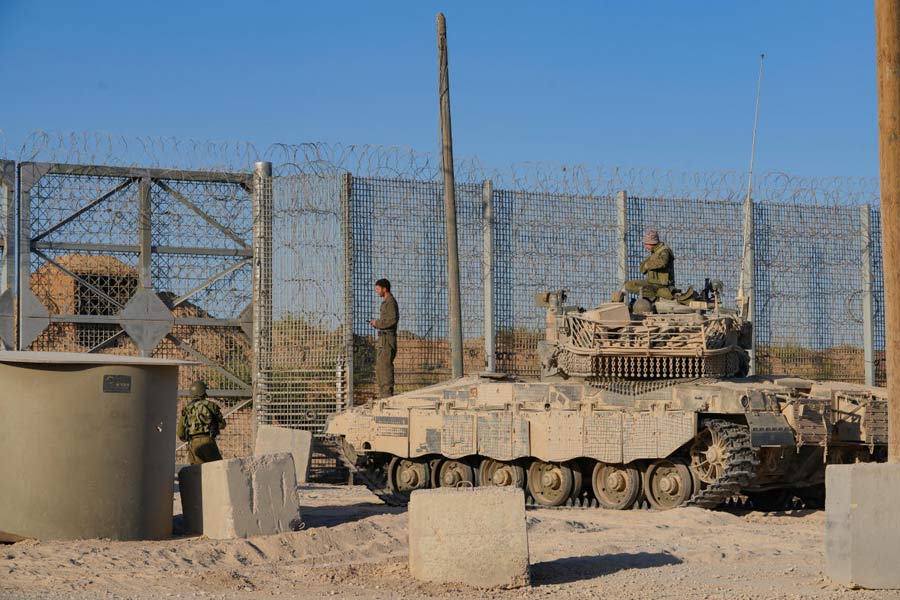U.S. envoy Amos Hochstein will be in Beirut on Monday for talks with Lebanese officials on conditions for a ceasefire between Israel and Lebanese armed group Hezbollah, two sources in Lebanon told Reuters, as Israel expanded its air campaign on the group’s assets overnight.
Israeli strikes late on Sunday hit several branches of a financial institution linked to Hezbollah in Beirut, Lebanon’s south and the Bekaa Valley, but no casualties were immediately reported.
Israel has reportedly given the United States a document with its conditions for a diplomatic solution to end the war in Lebanon, Axios reported on Sunday, citing two U.S. officials and two Israeli officials.
Israel has demanded its IDF forces be allowed to engage in "active enforcement" to make sure Hezbollah doesn't rearm and rebuild its military infrastructure close to the border, Axios reported, citing an Israeli official.
Israel also demanded its air force have freedom of operation in Lebanese air space, the report added.
A U.S. official told Axios it was highly unlikely that Lebanon and the international community would agree to Israel's conditions.
Cross-border fighting between Israel and Hezbollah erupted a year ago when the group began launching rockets in support of Palestinian militant group Hamas in Gaza.
At the start of October, Israel launched a ground assault inside Lebanon in an attempt to stabilise the border region for its citizens who had fled rocket attacks in northern Israel.
The U.S. and regional powers have tried for a year to secure a ceasefire in Gaza but the efforts have been unsuccessful, leaving Lebanese officials and many diplomats sceptical about the chances for a truce in Lebanon.
Financial site air strikes
Israel said its air force overnight attacked dozens of sites in Beirut and southern Lebanon used by Hezbollah to finance its operations, with reports that hundreds of Beirut residents fled their homes after multiple explosions in the Lebanese capital.
Reuters witnesses saw plumes of black smoke billowing in the air after at least 10 blasts in Beirut suburbs. Panicked crowds clogged streets and caused traffic jams in some parts of the city as they tried to get to neighbourhoods thought to be safer, witnesses said.
Eyewitnesses, who spoke on the condition of anonymity, said a building located in the Chiyah neighbourhood in the southern suburbs of Beirut was reduced to rubble and the few people in the area had fled ahead of the explosion, resulting in no casualties.
An Israeli military spokesperson said earlier in a statement posted on social media platform X that it "will begin attacking infrastructure belonging to the Hezbollah Al-Qard Al-Hassan Association - get away from it immediately."
Al-Qard al-Hassan - which the U.S. has said is used by Iran-backed Hezbollah to manage its finances - has more than 30 branches across Lebanon including 15 in densely populated parts of central Beirut and its suburbs.
There was no immediate statement from the organisation, Hezbollah or the Lebanese government.
Asked by journalists whether the branches could be considered military targets, a senior Israeli intelligence official said: "The purpose of this strike is to target the ability of Hezbollah economic function both during the war but also afterwards to rebuild and to rearm ...on the day after."
Israel has intensified its military campaigns both in Gaza and Lebanon, days after the killing of Hamas leader Yahya Sinwar raised hopes of an opening for ceasefire negotiations to end more than a year of conflict.
With U.S. elections approaching, officials, diplomats and other sources in the region say Israel is seeking through military operations to try to shield its borders and ensure its rivals cannot regroup.
Israel is also preparing to retaliate for an Iranian missile barrage earlier this month, though Washington has pressed it not to strike Iranian energy facilities or nuclear sites.
Earlier on Sunday Israel said it hit Hezbollah's intelligence headquarters and an underground weapons workshop in Beirut. Fighter jets killed three Hezbollah commanders, the Israeli military said.
Hezbollah made no immediate comment on those strikes, but said it had fired missiles at Israeli forces in Lebanon and at a base in northern Israel.
Hamas-led militants killed 1,200 people and took 250 hostages in the attack on Israel on Oct. 7 last year that sparked the war in Gaza, according to Israeli tallies.
Israel's military response in Gaza has left more than 42,500 people dead and has made most of Gaza's 2.3 million people homeless, Palestinian officials say.
Over the last year, Lebanese officials estimate that more than 2,400 people have been killed and more than 1.2 million people displaced in Lebanon. Fifty-nine people have been killed in northern Israel and the occupied Golan Heights over the same period, say Israeli authorities.











